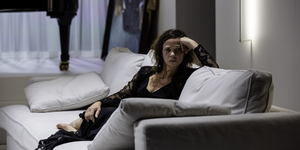
After several months of confinement, which proved particularly challenging for the artistic community, it was with great enthusiasm that we resumed our coverage of theatre productions in Luxembourg. Our first play of the season was Ibsen's Hedda Gabler, the realist masterpiece which gave us one of the most psychologically complex characters of the late 19th century. A weirdly relatable tale, where the protagonists find questionable solutions to challenges posed by morality, mental health and the role of women in society.
It follows the life of newlyweds Hedda (Myriam Muller), an upper-class woman incapable of finding joy in her life and in her marriage, and George Tesman (Tom Leick-Burns), an optimistic academic blindly in love with his wife. George's aunt Juliane (Nicole Dogué), one of the most frequent visitors of the house, takes far less time to understand Hedda's true nature and state of mind, yet plays along in the couple's artificial atmosphere for the sake of her nephew's happiness.
Throughout the story, Hedda enters a vicious cycle of depression and manipulation, twisting, using and ultimately being a victim of her relation with George's old friend Thea (Jeanne Werner), George's academic rival Ejlert (Valéry Plancke) and Judge Brack (Serge Wolf), an immoral public servant and family friend.
The gold: Myriam Muller. She was just that good. On stage pretty much the whole time, Muller set the pace of the entire play and did not allow the spirit of her character to drift one inch from its intended downward spiral. To be such a conductive force, while at the same time portraying a depressed and life-weary wife could make a less experienced actor lose the attention of the audience. However, even Muller's mannerisms and moments of silence were enough to grab the public. In fact, it sometimes felt like the lines were merely confirming what you had already learned from Hedda's overall attitude.
The silver: The clear difference between the three men. While Hedda is a complex woman meriting layers of analysis that go well beyond her gender, the role of women in society is one of the most important topics of the play. This dynamic is better understood through her interaction with three very distinct types of men. The script clearly establishes these distinctions, but it is up to the director to make them feel believable and organic. The balance is particularly hard to reach when you do not wish to turn three elements of the cast into mere stock characters. George's nature, for instance, could have easily made him look like a common simpleton with no personality, but Leick-Burns brilliantly avoids this trap.
The bronze: The little things. We have already mentioned the strength of the moments of silence. Small details like this gave the play a notorious depth, enriching both the narrative and the artistic style. A very clear example is the role of the maid (Hana Sofia Lopes), a character that barely speaks, but that adds a multitude of reflection points concerning class and womanhood.
This was a great way to start the season, our thanks to the Grand Theátre and everyone involved on this production.
To reach out to the writer: nuno.de.sousa.lopes@gmail.com
Image credit: Antoine de Saint Phalle
Reader Reviews

Videos

